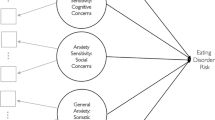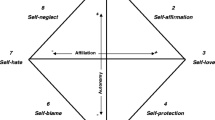Abstract
Social anxiety is a common comorbid problem in the eating disorders. The present study investigated whether specific types of core beliefs are common in eating-disordered individuals presenting with high levels of social anxiety. The participants were a group of 191 women meeting Diagnostic and Statistical Manual-IV (DSM-IV) criteria for an eating disorder. Young’s Schema Questionnaire (YSQ-S) was used as a measure of core beliefs, while a brief version of the Fear of Negative Evaluation scale (Brief FNE) was used as a measure of social anxiety. The results showed that eating-disordered individuals with high levels of comorbid social anxiety report higher levels of socially-oriented core beliefs (abandonment; defectiveness/shame) than those who experience low levels of social anxiety. The findings highlight the potential importance of addressing core beliefs in specific groups of eating-disordered individuals. Implications for future research and clinical practice are discussed.
Similar content being viewed by others
References
American Psychiatric Association: Diagnostic and statistical manual of mental disorders, 4th ed. Washington, Am. Psychiatr. Assoc., 1994.
Leahy R.L., Holland S.J.: Treatment plans and interventions for depression and anxiety disorders. New York, Guilford Press, 2000.
Hinrichsen H., Wright F., Waller G., Meyer C.: Social anxiety and coping strategies in the eating disorders. Eat. Behav., 4, 117–126, 2003.
Brewerton T.D., Lydiard R. B., Ballenger J.C., Herzog D.B.: Eating disorders and social phobia. Arch. Gen. Psychiatry, 50, 70, 1993.
Godart N.T., Flament M.F., Lecrubier Y., Jeammet P.: Anxiety disorders in anorexia nervosa and bulimia nervosa: Co-morbidity and chronology of appearance. Eur. Psychiatry, 15, 38–45, 2000.
Bulik C.M.: Anxiety, depression, and eating disorders. In: Treasure J., Schmidt U., van Furth E. (Eds.), Handbook of eating disorders. Chichester UK, Wiley, 2003, pp. 193–198.
Cooper M.J.: Cognitive theory in anorexia nervosa and bulimia nervosa: A review. Behav. Cogn. Psychother., 25, 113–145, 1997.
Cooper M.J., Wells A., Todd G.: A cognitive model of bulimia nervosa. Br. J. Clin. Psychol., 43, 1–16, 2004.
Hollon S.D., Beck A.T.: Cognitive and cognitive-behavioural therapies. In: Bergin A.E., Garfield S.L. (Eds.), Handbook of psychotherapy and behavioral change. New York, Wiley, 1994, pp. 428–466.
Meyer C., Waller G., Waters A.: Emotional states and bulimic psychopathology. In: Hoek H.W., Treasure J.L., Katzman M.A. (Eds.), Neurobiology in the treatment of eating disorders. Chichester, UK, Wiley, 1998, pp. 271–289.
Agras W.S., Walsh B.T., Fairburn C.G., Wilson G.T., Kraemer H.C.: A multicenter comparison of cognitivebehavioural therapy and interpersonal psychotherapy for bulimia nervosa. Arch. Gen. Psychiatry, 57, 459–466, 2000.
Cooper M.J., Todd G., Wells A.: Content, origins, and consequences of dysfunctional beliefs in anorexia nervosa and bulimia nervosa. J. Cogn. Psychother., 12, 213–230, 1998.
Waller G., Ohanian V., Meyer C., Osman S.: Cognitive content among bulimic women: The role of core beliefs. Int. J. Eat. Disord., 28, 235–241, 2000.
Beck J.S.: Cognitive therapy for challenging problems. New York, Guilford Press, 2005.
Young J.E., Klosko J., Weishaar M.: Schema therapy: A practitioner’s guide. New York, Guilford Press, 2003.
Andrews B.: Bodily shame in relation to abuse in childhood and bulimia: A preliminary investigation. Br. J. Clin. Psychol., 36, 41–49, 1997.
Meyer C., Waller G.: Subliminal activation of abandonment- and eating-related schemata: Relationship with eating disordered attitudes in a non-clinical population. Int. J. Eat. Disord., 27, 328–334, 2000.
Patton C.J.: Fear of abandonment and binge eating: A subliminal psychodynamic activation investigation. J. Nerv. Ment. Dis., 180, 484–490, 1992.
McManus F., Waller G., Chadwick P.: Biases in the processing of different forms of threat in bulimic and comparison women. J. Nerv. Ment. Dis., 184, 547–554, 1996.
Steiger H., Gauvin L., Jabalpurwala S., Seguin J.R., Stotland S.: Hypersensitivity to social interactions in bulimic syndromes: Relationship to binge eating. J. Consult. Clin. Psychol., 67, 765–775, 1999.
Leary M.R.: A brief version of the Fear of Negative Evaluation Scale. Pers. Soc. Psychol. Bull., 9, 371–376, 1983.
Watson D., Friend R.: Measurement of social-evaluative anxiety. J. Consult. Clin. Psychol., 33, 448–457, 1969.
Mattick R.P., Clarke J.C.: Development and validation of measures of social phobia scrutiny fear and social interaction anxiety. Behav. Res. Ther., 36, 455–470, 1998.
Stopa L., Clark D.M.: Social phobia: Comments on the viability and validity of an analogue research strategy and British norms for the Fear of Negative Evaluation Questionnaire. Behav. Cogn. Psychother., 29, 423–430, 2001.
Leary M.R.: Brief Fear of Negative Evaluation Scale (Brief FNE). In: Sajatovic M., Ramirez L.F. (Eds.), Rating scales in mental health. Hudson, OH, Lexi- Comp, 2001, pp. 47–48.
Young J.E.: Young Schema Questionnaire — Short Form (YSQ-S). New York, Cognitive Therapy Center of New York (Available at: http://www.schematherapy.com), 1998.
Waller G., Babbs M., Milligan R.-J., Meyer C., Ohanian V., Leung N.: Anger and core beliefs in the eating disorders. Int. J. Eat. Disord., 34, 118–124, 2003.
Fairburn C.G., Cooper Z., Shafran R.: Cognitive behaviour therapy for eating disorders: A ‘transdiagnostic’ theory and treatment. Behav. Res. Ther., 41, 509–528, 2003.
Waller G.: Why do we diagnose different types of eating disorder? Arguments for a change in research and clinical practice. Eur. Eat. Disord. Rev., 1, 74–89, 1993.
Rapee R.M., Sanderson W.C., Barlow D.H.: Social phobia symptoms across the DSM-III-Revised anxiety disorder categories. J. Psychopathol. Behav. Ass., 10, 287–299, 1988.
Padesky C.A.: Schema change processes in cognitive therapy. Clin. Psychol. Psychother., 1, 267–278, 1994.
Fennell M., Jenkins H.: Low self-esteem. In: Bennett-Levy J., Butler G., Fennell M., Hackmann A., Mueller M., Westbrook D. (Eds.), Oxford guide to behavioural experiments in cognitive therapy. Oxford, UK, Oxford University Press, 2004, pp. 413–430.
Arntz A., Weertman A.: Treatment of childhood memories: Theory and practice. Behav. Res. Ther., 37, 715–740, 1999.
Hinrichsen H., Waller G.: The treatment of avoidant personality disorder in patients with eating disorders. In: Sansone R.A., Levitt J.L. (Eds.), Personality disorders and eating disorders: Exploring the frontier. New York, Brunner-Routledge, 2006.
Ghaderi A.: Does individualization matter? A randomized trial of standardized (focused) versus individualized (broad) cognitive behavior therapy for bulimia nervosa. Behav. Res. Ther., 44, 273–288, 2006.
Author information
Authors and Affiliations
Corresponding author
Rights and permissions
About this article
Cite this article
Hinrichsen, H., Waller, G. & Dhokia, R. Core beliefs and social anxiety in the eating disorders. Eat Weight Disord 12, e14–e18 (2007). https://doi.org/10.1007/BF03327776
Received:
Accepted:
Published:
Issue Date:
DOI: https://doi.org/10.1007/BF03327776




